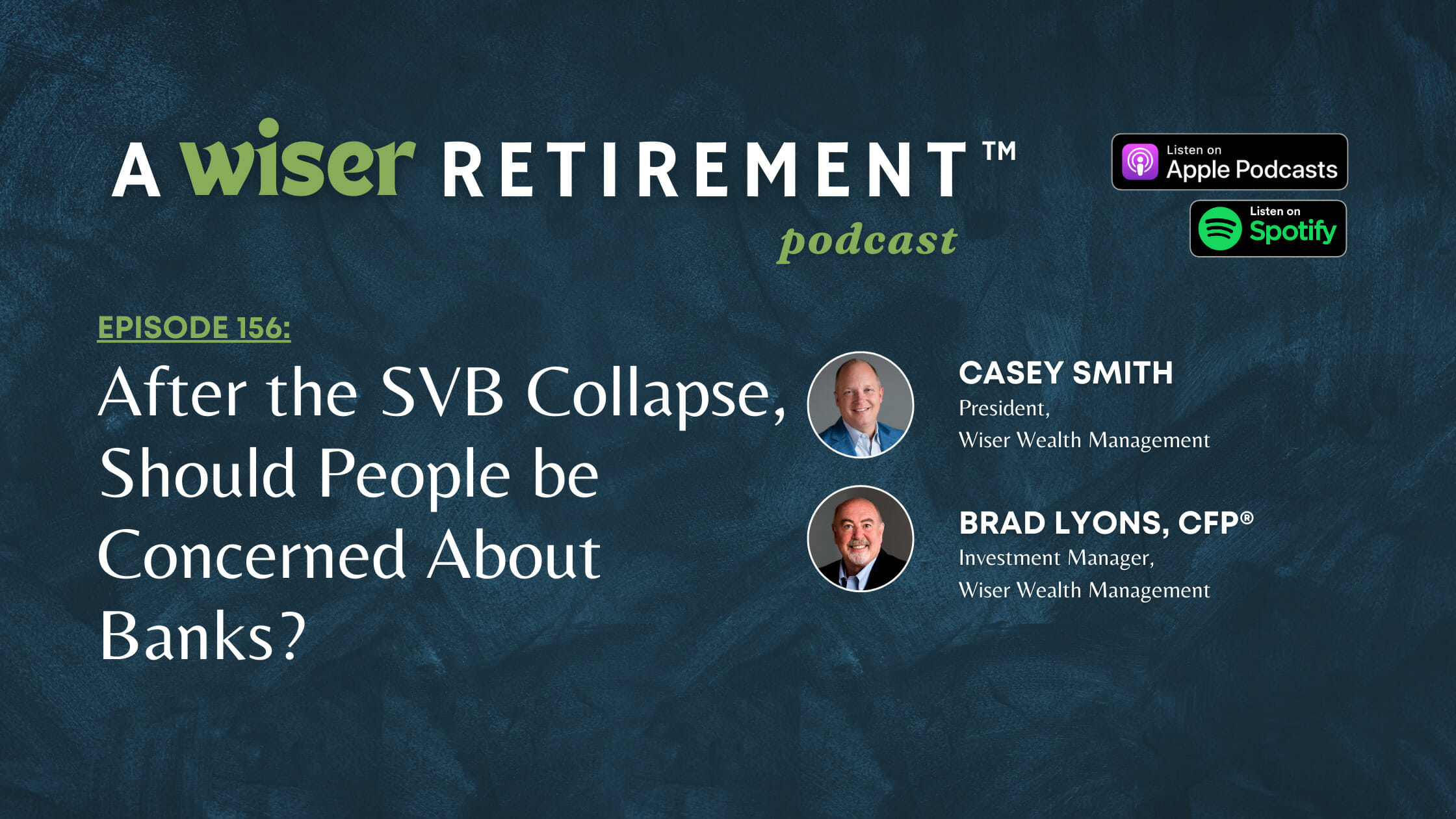
After the SVB Collapse, Should People be Concerned About Banks?
On this episode of A Wiser Retirement™ Podcast, Casey Smith, and Brad Lyons, CFP®, discuss the Silicon Valley Bank collapse and if people should be concerned about banks now.
Listen on Apple Podcasts or watch on YouTube:
SUMMARY:
The year 2023 has so far provided us with various news concerning the financial sector. Some good news and some not so good. Amongst these news are the Silicon Valley Bank collapse, and ESG investing being blocked by congress and then this bill vetoed by President Biden. Today, we majorly cover these two topics.
What is ESG?
Environmental Social Governance, also known as ESG has recently been in the news since congress voted to block ESG investing. ESG is in simplification a rating that each company can receive considering how they are able to help the environment, and how they conduct business as corporate citizens. If we look at companies in the S&P 500, most if not all of them have ESG ratings.
Some Negative Points About ESG
The problem with ESG is that there are multiple criteria, and at the moment there is no uniform way of evaluating parameters for setting ratings. Many say that ESG is the future of investing and companies will eventually be rated as a whole in accordance to their ESG ratings. On the other hand, we believe that no matter what the new trends are, companies will ultimately only survive through profit. We always remind clients to be careful with the band wagon movement when it comes to investing. The news or current trends might not be what is most beneficial to your investment plans in the long run.
Silicon Valley Bank Collapse and Recent Acquisitions
On another note, while the Silicon Valley Bank collapse happened earlier in March 2023, there have been more developments on this case. Many wonder how a bank that big could declare bankruptcy all of the sudden. The biggest reason for the collapse lies in the inverse correlation of U.S. treasuries and interest rates. For a long time we had very low interest rates, this allowed banks to invest depositors money in bonds for an extended amount of time, and receive good yield. However, as interest rates started to rise, bond prices started to decrease. Additionally, SVB’s depositor base was highly concentrated in Silicon Valley, which means their clients were mostly technology and venture capital firms. As these clients began to need capital, they started to become more concerned about their deposits in the bank. This caused a “bank run” and in only one day customers withdrew $42B dollars.
The Silicon Valley Bank Collapse sent shock waves across the country and all the way to North Carolina where a local bank, the First Citizens Bank won the bid and recently purchased all SVB’s loans and deposits.
Should We Be Concerned About Banks Going Forward?
In summary, no. Other banks have a much more diversified customer base, which helps prevent a sudden collapse as we’ve just seen. However, the truth is that no bank would be able to give back money if everybody wanted to withdraw all their cash at the same time. SVB did invest in the safest securities, but unfortunately they mismatched the time of maturity in the bonds held. In conclusion, as consumers we are left to do our own due diligence on the bank we choose to deposit our money. It’s important to understand FDIC and how much you are insured through it.
Download our eBook on “Top Reasons Most Financial Plans Fail”
TIMESTAMPS:
0:00 Intro
1:35 What is ESG?
2:45 Some Negative Points About ESG
26:10 Silicon Valley Bank Collapse and Recent Acquisitions
37:30 Should We Be Concerned About Banks Going Forward?
LINKS:
Learn more about Casey Smith and Brad Lyons, CFP®
CONNECT:
Twitter, Instagram, Facebook, LinkedIn, and YouTube.
Learn more about A Wiser Retirement™ podcast and access previous episodes.
Share This Story, Choose Your Platform!
Wiser Wealth Management, Inc (“Wiser Wealth”) is a registered investment adviser with the U.S. Securities and Exchange Commission (SEC). As a registered investment adviser, Wiser Wealth and its employees are subject to various rules, filings, and requirements. You can visit the SEC’s website here to obtain further information on our firm or investment adviser’s registration.
Wiser Wealth’s website provides general information regarding our business along with access to additional investment related information, various financial calculators, and external / third party links. Material presented on this website is believed to be from reliable sources and is meant for informational purposes only. Wiser Wealth does not endorse or accept responsibility for the content of any third-party website and is not affiliated with any third-party website or social media page. Wiser Wealth does not expressly or implicitly adopt or endorse any of the expressions, opinions or content posted by third party websites or on social media pages. While Wiser Wealth uses reasonable efforts to obtain information from sources it believes to be reliable, we make no representation that the information or opinions contained in our publications are accurate, reliable, or complete.
To the extent that you utilize any financial calculators or links in our website, you acknowledge and understand that the information provided to you should not be construed as personal investment advice from Wiser Wealth or any of its investment professionals. Advice provided by Wiser Wealth is given only within the context of our contractual agreement with the client. Wiser Wealth does not offer legal, accounting or tax advice. Consult your own attorney, accountant, and other professionals for these services.





